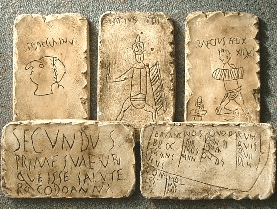In a break from the norm I shall start this contribution not with a glib remark or unnecessary bit of pretentiousness, but with a warning. This week’s article will be a bit on the spicy side both in terms of language and sexual content. If either offend you then I strongly suggest that you stop reading….
…now!
Okay, now that the kids have been put to bed, we can leave behind our everyday banalities and plunge head-first into a world of sex,
swearing, toilet-humor, bravado, machismo and politics. No, not HBO – today we concern ourselves with the most accessible and least analyzed form of ancient Latin literature; graffiti.
In all fairness, it is no fault on the part of archaeologists or literary scholars that graffiti of the ancient world sits on the back-burner. Most has been destroyed and much that remains is very difficult to decipher.
The wonderful exceptions to this are the examples surviving at Pompeii and Herculaneum. If these tragically, but beautifully, preserved cities are anything to go by, then we can assume that ancient Italy would have been daubed in even more graffiti than… well, modern Italy.
So what sort of thing lined the walls of the shops, houses, brothels and public buildings of these ancient towns before they were paradoxically destroyed – and preserved – from the eruption of Mount Vesuvius in 79 AD?
Well, much as we might expect, there was plenty of love in the air. “Marcus loves Spendusa” and “Rufus loves Cornelia Hele” are two examples which make us realize just how unoriginal some modern graffiti actually is.
However, at least this is pleasant and innocent enough. After all, declarations of love can be tainted with a fair amount of bitterness, especially in the middle of a love triangle: “Successus, a weaver, loves the innkeeper’s slave girl named Iris. She, however, does not love him. Still, he begs her to have pity on him. His rival, Severus wrote this. Goodbye.”
To which is replied: “Envious one, why do you get in the way? Submit to a handsomer man and one who is being treated very wrongly.”
The final word being: “I have spoken. I have written all there is to say. You love Iris, but she does not love you.”
The beauty of these inane scribbles is they tell us exactly how everyday folk thought and spoke. This was not high art, this was not epic poetry, this was the voice of the man in the street; an ancient twitter account, but perhaps read by someone who the writer actually knew!
And as with social networking, public walls were deemed the ideal receptacles for the angst of the lovelorn: “Let everyone in love come and see. I want to break Venus’ ribs with clubs and cripple the goddess’ loins. If she can strike through my soft chest, then why can’t I smash her head with a club?”
And of course, as one would expect of graffiti, romantic love very often played second fiddle to sexual desire:
“I screwed a lot of girls here.”
“On June 15th, Hermeros screwed here with Phileterus and Caphisus.”
“Sollemnes, you screw well!”
Are just a few of many such examples.
However, these are on the tame side. A more explicit examples is:
“Restituta, take off your tunic, please, and show us your hairy privates.”
A relatively polite request. Though some scribbles are more bragging in their tone:
“Floronius, privileged soldier of the 7th legion, was here. The women did not know of his presence. Only six women came to know, too few for such a stallion.”
Whilst others may be a chide to a straying lover:
“Amplicatus, I know that Icarus is buggering you. Salvius wrote this.”
And others simply wish to offer advice – sometimes cryptic:
“The one who buggers a fire burns his penis.”
Sometimes domestic:
“Take hold of your servant girl whenever you want to; it’s your right.”
Often tourist:
“If anyone sits here, let him read this first of all: if anyone wants a screw, he should look for Attice; she costs 4 sestertii.”
Occasionally written by women:
“Crescens the retarius, lord and healer of the girls at night.”
That’s not to say all the advice on display is sexually oriented:
“A small problem gets larger if you ignore it,” is a slightly more profound graffito.
 Indeed, sexual content was not universally approved of, as this example from the ‘House of the Moralist’ shows:
Indeed, sexual content was not universally approved of, as this example from the ‘House of the Moralist’ shows:
“Remove lustful expressions and flirtatious tender eyes from another man’s wife; may there be modesty in your expression.”
Perhaps the same author was responsible for this domestic tip:
“Let water wash your feet clean and a slave wipe them dry; let a cloth cover the couch; take care of our linens.”
At times the role of ancient graffiti was more practical; shopping lists and details of rooms for rent have been identified in addition to plenty of election campaigning.
However, the Romans were not above a little outright abuse:
“Phileros is a eunuch!”
“Chie, I hope your hemorrhoids rub together so much that they hurt worse than when they ever have before!”
That said, there was also a fair share of humor being waggishly daubed about:
“May he who vandalizes this picture incur the wrath of Pompeian Venus” was written over the picture in question.
“We have wet the bed, host. I confess we have done wrong. If you want to know why, there was no chamber pot” was found in a tavern.
However the winner is the following graffiti, simply because of how the joke must have come across when archaeologists first uncovered and then slowly translated it:
“O walls, you have held up so much tedious graffiti that I am amazed that you have not already collapsed in ruin.”
Then there are the fine examples of superior graffiti that help elevate what might be expected from such a genre – and these are certainly worth bearing in mind the next time you’re in a rest stop bathroom, pen in hand, thinking desperately for an original rhyme for ‘Nantucket’:
“Lovers are like bees in that they live a honeyed life.”
“Let whoever loves prosper; but let the person who doesn’t know how to love die. And let the one who outlaws love die twice.”
“Nothing can last for ever; once the sun has shone, it returns beneath the sea. The moon, once full, eventually wanes, the violence of the winds often turns into a light breeze.”
“If you are able, but not willing, why do you put off our joy and kindle hope and tell me always to come back tomorrow. So, force me to die since you force me to live without you. Your gift will be to stop torturing me. Certainly, hope returns to the lover what it has once snatched away.”
And if they don’t stir something within your soul… well, read the dirty ones again











One comment
Excellent!
Trackbacks
Our apologies, you must be logged in to post a comment.